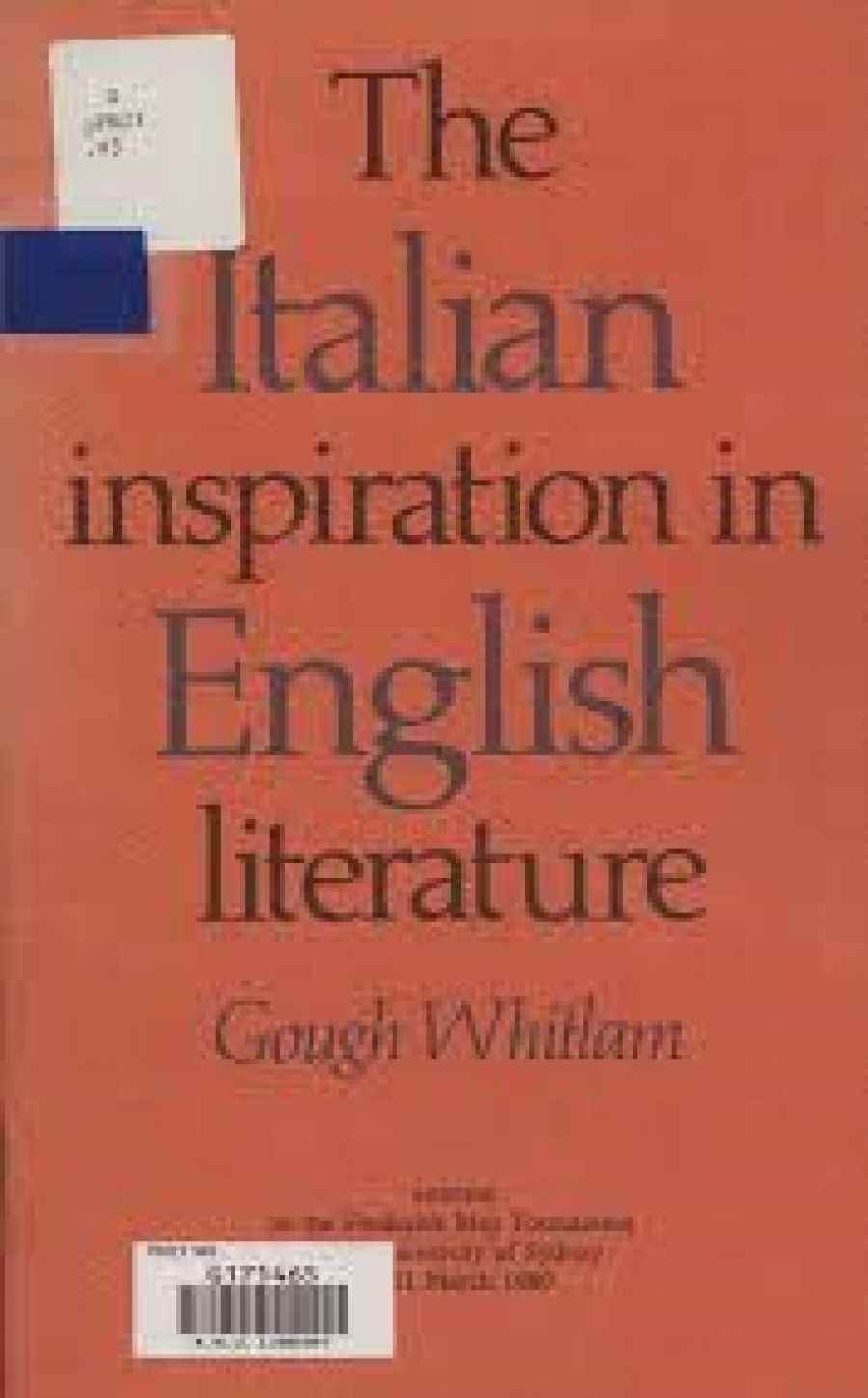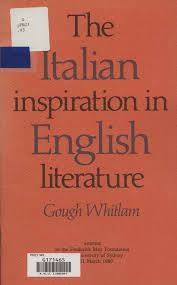
- Free Article: No
- Contents Category: Literary Studies
- Review Article: Yes
- Article Title: An Italian Pot Pourri
- Online Only: No
- Custom Highlight Text:
As soon as I read the title, I welcomed Mr Gough Whitlam’s pamphlet following perhaps an instinctual and rather biased interest in all that concerns both Italian and English literatures, and even more so whenever I come across an analysis of cross-currents between the two. My enthusiasm, however, was but short-lived. What the booklet offers, in fact, is only an enormous and indigestible amount of information, collated in a hopscotch fashion, with hardly any attempt to classify it in any way or to illustrate the purpose of such a mammoth task; it eventually fails to offer the reader a satisfactory overall picture, however superficial, of what the author means by ‘Italian Inspiration in English Literature’.
- Book 1 Title: Italian Inspiration in English Literature
- Book 1 Biblio: ANU Press, 23 pp, $3.95 pb
- Book 1 Cover Small (400 x 600):

From the contents of his paper, I gathered that the author was addressing a mixed audience, whom he must have expected to be more receptive to hearing as many instances as possible of Italian contributions in the world of AngloSaxon culture than eager to be enlightened on the quality and the subtleties of those same contributions. He would have obtained a more rewarding result had he restricted the lecture to an analysis of only a few choice examples of how, to what extent and why certain trends in English Literature have benefited from a close encounter with the Italian authors. As it stands, it appears like a pot pourri of dates and names, and many of the latter would sound cryptic to a non-initiate who is not greatly familiar with either of the two cultures; in the end he would inevitably remain a non-initiate. On the other hand, if the paper was meant for an academic audience, the information that it provides is by no means original, as it limits itself only to an enumeration of widely accepted facts.
The question of how the English authors absorbed and re-elaborated some of the Italian literary genres and themes in the past six centuries, in order to widen their scope and enrich their inspiration, remains untouched. What we are left with in the end is a blurred. recollection of known as well as unfamiliar names, thrown together by some law that in the long run remains mysterious. Would it not have been more stimulating had Mr. Whitlam offered at least some insight, for instance, into why Dante, the ‘summa· totalis’ of the Italian Middle Ages, encountered so much success among the literary men of post-schismatic England? And why not delve into Chaucer’s relationship with Boccaccio, instead of simply reducing it to a skimpy list of alleged borrowings? Not to mention the two-page long catalogue of two centuries of English pastoral plays ‘showing traces of Italian influence’ (sic); what does Mr Whitlam mean by ‘traces’?
There are some flaws too, here and there, in Mr Whitlam’s erudition; one of the mst obvious is that, according to him, Illyria (the setting of Shakespeare’s Twelfth Night and roughly situated in the area of today’s Albania) is in Italy, whereas it has never ever been an Italian province. After twenty odd pages tightly packed with a proliferation of English authors and works who have shown a partiality for an Italian connection, we are not given the satisfaction of discovering where their so-called ‘fascination’ with Italy (as Mr. Whitlam puts it) stemmed from; all we are informed about is that those authors often chose to draw inspiration from Italian sources instead of more understandably relying for it on the wealth of their national heritage. Mr Whitlam’s survey is too ambitious: to cover six centuries of literature in two countries, as well as trying to prove his initial argument in so short a space, is only destined to result in generalisations, and awkwardness if not lack of judgement.
My next point concerns an aspect of the style rather than the contents of the paper. Although Mr Whitlam might resort to them to enliven a public address in another context, I believe that he should have left the occasional autobiographical digressions but of this one: they seem to be aimed at building his image as the Protector and Promoter of the Italian literary tradition in the Anglo-Saxon world, rather than adding something to our knowledge or to his presentation of the subject.
I do not see how Mr Whitlam ‘s pamphlet could be described as ‘potentially stimulating’ towards a major research project: the lack of a consistent and cohesive· methodological criterion in his approach to and handling of the topic, beside the descriptive, and even casual, rather than critical analysis of the subject might discourage instead of promoting further enquiries into the field. To conclude, I would like to make but one more suggestion. Would Mr Whitlam, please brush up his French (or his Italian ): the word ‘forte’, used in the context of someone’s strong point, is not, as he claims, a French word, but an Italian one. It is one more authentic example of the living Italian influence on English culture . . . and he missed it!


Comments powered by CComment